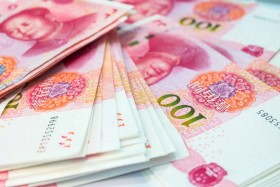The Chinese yuan is weakening midweek as a new report suggests officials are considering additional fiscal and monetary stimulus to rejuvenate the post-coronavirus economy. As the country gradually returns to normal and even ends the lockdown in Wuhan, authorities are discussing a wide range of options. Over fears of a second wave, China could serve as a case study for the rest of the world in what to do after COVID-19.
According to Reuters, the Peopleâs Bank of China (PBoC) is anticipated to accelerate its policy easing to support the worldâs second-largest economy. Although the PBoC is joining other central banks in ramping up easing efforts, it is not expected to mirror the Federal Reserve due to debt and property risk woes. So, what else will the central bank do?
Policy sources told the newswire that the PBoC would continue to increase credit and slash funding costs, particularly for smaller companies that are integral to economic growth and job creation. The central bank will also accommodate greater fiscal spending by President Xi Jinping and his administration. Ultimately, the PBoC will utilize a concoction of liquidity and price-based tools to shore up the economy.
In recent weeks, the central bank has reduced the reserve requirement ratio (RRR), cut the rate on banksâ excess reserves, and implemented various lending facilities. The Fed brought rates to 0%, unleashed quantitative easing infinity, and scooped up federal government, corporate, and municipal bonds. This would not work for China, says Vice PBOC governor Liu Guoqiang, due to inflation risks, bubble fears, and threats to savers.
An unnamed source told the publication:
We should continue to cut RRR and interest rates. But we should be worried about the side-effects if monetary policy easing becomes too strong, as we are still digesting the hangover from previous stimulus measures.
If more money flows into the property sector, it would fuel property speculation and lead to social problems.
On the fiscal side, China will continue to rely on vouchers to elevate consumer spending, but officials have dismissed direct payments. Across the country, dozens of jurisdictions have issued more than $700 million in vouchers to residents. So far, the vouchers have averaged about $14, and the stimulus is expected to be paid for by issuing bonds â Beijing recently permitted cities to raise revenues through new bonds.
However, Zhu Zhengfu, a member of the Chinese Peopleâs Political Consultative Conference, says it would be more suitable to give each citizen a pandemic subsidy of around $300. This would be equivalent to how much consumers spent last year.
On the data front, foreign exchange reserves tumbled from $3.107 trillion in February to $3.061 trillion in March.
The USD/CNY currency pair advanced 0.24% to 7.0631, from an opening of 7.0459, at 13:54 GMT on Wednesday. The EUR/CNY rose 0.07% to 7.6907, from an opening of 7.6839.
If you have any questions, comments, or opinions regarding the Chinese Yuan, feel free to post them using the commentary form below.
